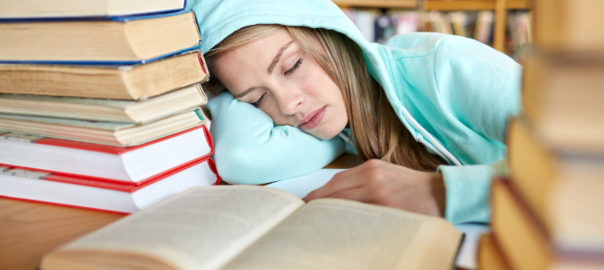WHY TEENS NEED THEIR ZZZs

As a former mental health counselor in our public high schools, I’ve seen one too many bleary-eyed, emotionally distraught teen, having left class to see me because they could no longer cope. I was often surprised to learn that many of these teens—presenting with symptoms of depression, anxiety, and sometimes suicidality—had been averaging six or fewer hours of sleep a night.
What I was seeing in our schools and now observe in my private practice is part of an epidemic of insufficient sleep among our youth—and it’s posing a risk not only to our kids’ physical wellbeing, but also to their emotional and psychiatric health.
Teens need more sleep than adults do, with most typically requiring a little over nine hours of nightly sleep to function optimally and to avoid the perils of insufficient sleep, yet many surveys show that few get it. A study published in the Journal of Adolescent Health found that 2/3 of high school students get less than seven hours of sleep nightly, with girls and students in higher grades getting the least amount of sleep.
The Academy of Sleep Medicine (AASM), in its first ever official consensus recommendations for pediatric sleep released this June, stated that “. . . insufficient sleep in teenagers is associated with increased risk of self-harm, suicidal thoughts and suicide attempts.” The AASM estimates that the average high school student misses one to three hours of sleep on school nights, racking up a weekly sleep debt of five to 15 hours. Teens often compensate by sleeping much later on the weekends, further disrupting the inner body clock and effectively giving teens a bad case of jet lag every week.
During the school year, weekday sleep deprivation has become a way of life for many teens, with academics, sports, extracurricular activities, and the demands to be available 24/7 on social media all competing for precious time—squeezing out quality sleep. As part of normal development, the adolescent’s internal body clock shifts to a later timing for sleep, creating a natural tendency to go to bed later and get up later, which is at odds with early school start times, further exacerbating the teen sleep crisis.
“Reduced sleep negatively effects many biological processes—from immune function, proper hormonal balance and weight regulation to proper brain function, including learning, memory, creativity and emotional balance.”
“The pressure to do it all butts up against the need for sleep,” says Dr. David Yoshihara, the superintendent of the Tamalpais Union High School District in Marin County, CA. “It’s an intense schedule for our kids and the priority of sleep sometimes isn’t there. I’d like to see how to involve parents more in becoming part of the solution. Balancing sleep needs with everything else is difficult.”
What parents and teens may fail to realize is that reduced sleep negatively affects many biological processes—from immune function, proper hormonal balance and weight regulation to proper brain function, including learning, memory, creativity and emotional balance. As sleep declines, so do grades, health, and athletic performance. Insufficient sleep has been linked to school absenteeism, drowsy driving accidents, weight gain, behavior and attention problems, acne, poor relationships, and substance abuse.
As a therapist, I’m most concerned about the growing body of research showing that poor sleep heightens the risk of depression, anxiety, and substance-related problems. Poor sleep is an independent risk factor for mental illness, not merely the byproduct of a pre-existing mental disorder or precursor to one. Moreover, sleep disruption can worsen symptoms of an existing psychiatric disorder and hamstring a full recovery.
The teen years are a time of increased vulnerability, with research showing that half of all lifetime mental illnesses start by age 14. One in five teens ages 13 to 18 have or will have a serious mental illness. Optimal sleep is a protective factor, tilting the scales towards mental and emotional health.
Sleep deficits disturb areas of brain function in which even well-rested teens struggle: Executive function, self-control, and judgment, leading to high risk behaviors, such as substance abuse. I have seen many teens choosing to manage their daytime sleepiness with highly caffeinated energy drinks, tobacco, and other stimulants and then resorting to alcohol and marijuana to induce sleep at night.
Balance only can be achieved through hard trade-offs. We simply can’t have it all and do it all and the sooner our kids learn this lesson the better. With so much at stake, I urge parents to take the lead in helping their teens adopt healthy sleep habits.
Here are some guidelines:
MAKE SLEEP A PRIORITY
Find out how much sleep your adolescent is actually getting and what is preventing them from getting enough. Talk to your teen about the benefits of sleep and what needs to change to improve sleep habits. Guide them in re-examining choices about what truly are essential activities. Teens may not listen to you but they will imitate you. As a parent, it’s important to model healthy sleep choices.
SET AN EARLIER BEDTIME
Too often parents back off from enforcing a reasonable (10 p.m.) bedtime when their children get older, yet research has shown that when parents set an earlier bedtime it encourages kids to get to bed earlier and that adolescents largely comply with their parents established bedtimes. A study published in SLEEP found that teens with earlier parental set bedtimes were significantly less likely to suffer from depression or to have thoughts of suicide.
ESTABLISH A CONSISTENT SLEEP/WAKE CYCLE
Helping teens go to bed and get up about the same time every day, including weekends, keeps them in sync with the natural rhythms of their biological clocks, making it easier to go to bed and obtain the needed 8-10 hours of sleep a night.
ENFORCE AN ELECTRONICS CURFEW
A culture of evening engagement with late-night studying, texting, gaming, and internet surfing conspires to rob our kids of sleep. Our brains need a dimmer switch and a period of reduced activity to prepare for sleep. The blue light emitted by many electronic devices sends alerting signals to the brain and inhibits the flow of melatonin, a sleep-inducing hormone. Video gaming and social media consistently have been tied to shorter sleep for teens. While teens cannot change their biological clock—which prompts them to fall asleep and wake up later–they can counteract their naturally heightened evening alertness by retiring their gadgets an hour before bedtime.
TRANSFORM THE BEDROOM INTO A SLEEP SANCTURARY
It’s hard to sleep when your bedroom is associated with stressful homework or nonstop social banter. Ideally, ban computers and other electronic devices from the bedroom. Keep the bedroom cool, quiet, and dark to enhance the likelihood of good sleep. Consider black out shades. Don’t do anything in bed but sleep. If your teen cannot sleep after 20 minutes, encourage them to get out of bed, stretch quietly or read by flashlight, and then try to sleep again.
FIND WAYS FOR YOUR TEEN TO WIND DOWN
Help them avoid sleep disrupters like energy drinks, coffee, cola, and chocolate six hours before bedtime. If your teen runs anxious, suggest that they download their worries in a journal or alternately tense and relax each muscle group before going to bed. If you sense that your teen sleeps too little or too much and may have a sleep disorder, seek an evaluation from your pediatrician.
Sleep is an unconditional necessity, not a dispensable commodity—one that plays a key role in the emotional and psychiatric health of our kids. If we care about our teen’s wellbeing and achievement, this is an issue that should be of deep concern to parents, school, and public health officials.
As a therapist, I’m humble enough to realize that any therapies I can offer will do little to help if the basic mental health of the teens I treat isn’t protected through adequate sleep.
